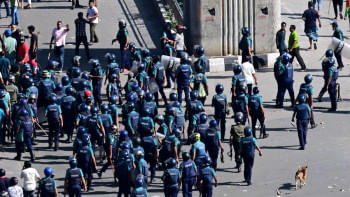Why can't the government rein in crime and violence?

We are concerned about the deteriorating law-and-order situation in the country, including in Dhaka, Chattogram and Narayanganj. Media reports indicate a noticeable rise in incidents of violence, murder, mugging, and robbery as law enforcement agencies struggle to ensure security despite increased vigilance. Muggings and killings, in particular, have become quite common, with bodies of victims reportedly being found in lakes, rivers and open fields. The perception of security forces playing a reactive role—as evidenced by instances where crime or violence was anticipated, but couldn't be prevented—is only heightening the sense of insecurity among citizens.
A quick search online would reveal a wide spectrum of crimes: from the dramatic bank heist attempt in Keraniganj to the strangling to death of a nine-year-old in Satkhira, from the brazen muggings and equally brazen lynching of suspected muggers to the gruesome discoveries of buried bodies in different areas. On December 18, four people were killed and 50 others injured during a violent clash between two factions of Tablighi Jamaat in Tongi, Dhaka. On December 12, two students involved with the anti-discrimination student movement were hacked mortally. These incidents show how opportunistic criminals and anarchists are exploiting the fluid security situation to commit crimes and disrupt public order.
Adding to this crisis is the proliferation of stolen arms and ammunition, with police sources indicating that many firearms looted from police stations following the mass uprising have not yet been recovered. Reportedly, criminals including escaped prisoners, youth gangs and extremists are using these weapons to commit crimes. While joint security drives are going on to reclaim these weapons, progress has not been swift or satisfactory. In any case, as police data suggests, whatever the reason behind the surge in criminal activities, efforts by the authorities are proving ineffective to contain this wave of lawlessness. For example, according to an estimate, 583 people were killed in September, 399 in October, and 337 in November. In contrast, during the same months last year, the numbers of murders were lower—238, 258, and 227, respectively.
One of the reasons behind police struggles to contain rising crime in Dhaka, and in other areas, is that the replacement of many police officers after the uprising has created an intelligence gap about criminal trends and activities of offenders, resulting in inadequate response by those newly assigned to police stations. Moreover, there still seems to be a reluctance among many officers to file cases, apparently because more cases would mean a heavier workload. Clearly, we cannot tackle crimes head-on without our police being fully equipped and motivated. The home affairs adviser's assurance—that patrol will be increased, including during wee hours when there are greater risks of mugging—may not work if the many security loopholes that now exist are not addressed simultaneously.
What we need is a comprehensive strategy that includes improving detection of potential criminal and violent developments, enhancing police-community cooperation, and properly utilising security forces to neutralise threats. Since the rising trends of crime and violence have been noted across the country, the whole security apparatus must be engaged so that public concerns about security can be effectively addressed.


 For all latest news, follow The Daily Star's Google News channel.
For all latest news, follow The Daily Star's Google News channel. 










Comments